
The Bottom Line
Introduction
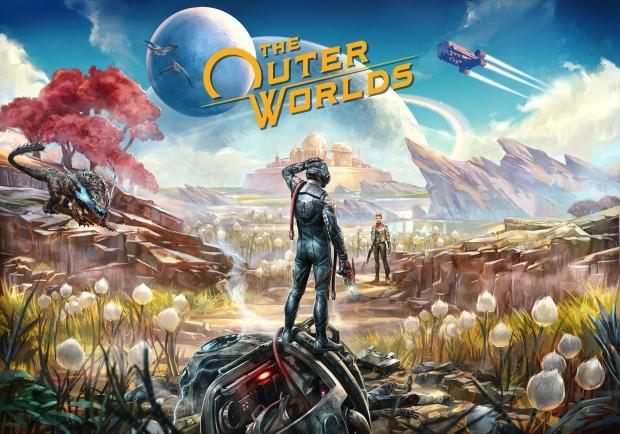
Developer: Obsidian Entertainment
Publisher: Private Division
Platform: PS4 (Reviewed), PC, Xbox One
Release Date: October 25, 2019
Genre: RPG, First-person shooter
MSRP: $59.99
The Outer Worlds is an entire video game based around one simple question: What if Amazon ruled the cosmos? The game is set in a semi-dystopian future where corporations, not nations, reign over entire planets. Humans are just a commodity without any individualism--they're just extensions of their corporate overlords. It sounds depressing, but Obsidian makes it fun.
With The Outer Worlds, Obsidian has crafted an RPG with tons of satirical snark wrapped up in their humorous, jaunty style, creating a unique gameplay experience that's one-part a critical examination of capitalism through the lens of wit, and one-part damn good RPG. Both come together to make a surprisingly delicious and unique blend.
The Outer Worlds is a mix of Obsidian's best talents (and their shortcomings, too). It's a fusion of everything they've done so far that doesn't take many risks. But the result is a damn fine example of a tried-and-true method. If it isn't broken, don't fix it.
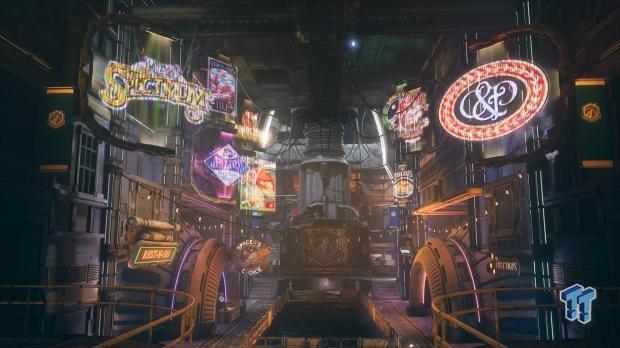
If you're looking for a classic Obsidian-style RPG with obvious Fallout overtones, The Outer Worlds is for you. Although this is an FPS, it's not really an action game. It's a game mostly about tactical strategy than great aim; your foundation is your build quality and team synergy.
At its core, The Outer Worlds is Obsidian's own unique answer to modern Fallout shooters. It's also an ode to those older RPGs of yore, the kind where skills are extremely synergized and often lead to unexpectedly awesome builds. The kind of games where experimentation is key, where there's a lot of choices, and where everything feels meaningful.
With original Fallout devs Tim Cain and Leonard Boyarsky at the helm, The Outer Worlds feels, looks, and plays more like Fallout than, say, Fallout 76. It has some old throwbacks to Fallout 1 with its flaws system, and the skills are entwined like an old cRPG. It also steals BioWare's thunder with its amazing companions and humorous/meaningful dialog sequences that often branch out into optional side quests.
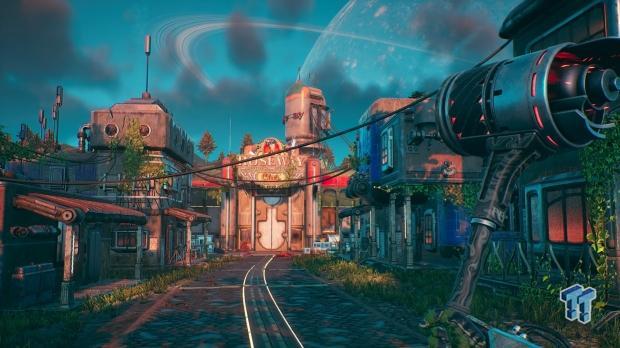
But it's not nearly as big as a Fallout game.
The Outer Worlds is AA through-and-through and doesn't have the same luster or expansiveness of games like Fallout 4. You won't see a huge 100+ storyline with tons of sidequests, collectibles, or big mod support. The Outer Worlds' size doesn't actually detract from the game and adds to the mystique and overall charm to the experience.
The game is basically a self-contained slice of Obsidian's most potent skills. It's a singleplayer-only RPG without any crazy live-oriented multiplayer or grinding. You don't have to spend a lot of time to beat it, nor do you have to min-max everything or collect all the weapons. Those paths are there if you want them, but by no means are they necessary.
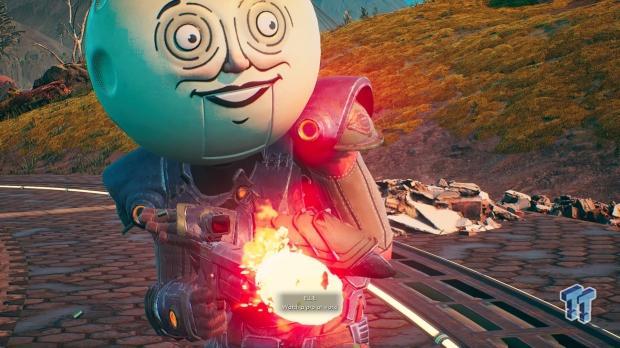
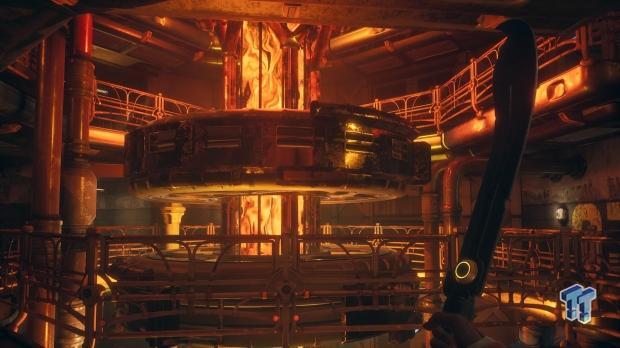
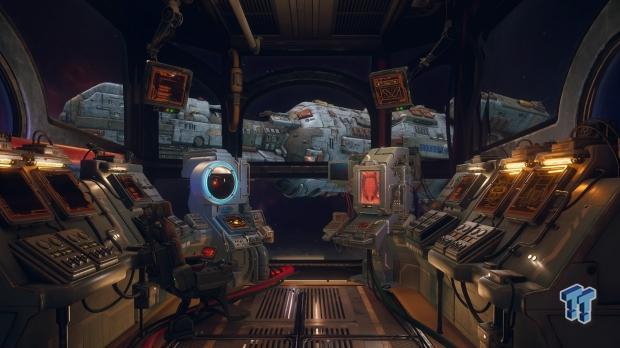
That's what I find most refreshing about The Outer Worlds. It's authentic and doesn't lie to you. It tells you what you're going to get upfront, a Fallout: New Vegas in space with deep KOTOR-like mechanics with a beginning, middle, and end.
There's no crazy grinding or crafting to artificially elongate playtime (although there is weapon maintenance and crafting, it's done in a way that's not extremely detrimental to the player).
Obsidian respects you as an RPG fan, and more importantly, it respects your time. It doesn't bog the game down with too many complicated systems.
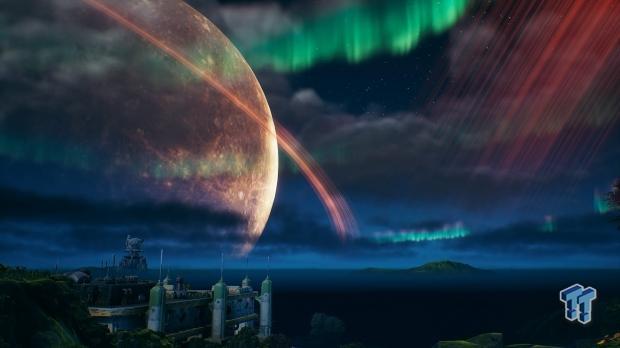
Instead, its RPG mechanics are interwoven in a logical and satisfying way that ensures none of your choices are actually bad choices. They're just choices. Everything you choose to do, from what quests you tackle, who you choose to help, or what skills or weapons you choose to use--everything is valid and has a meaningful consequence. Sometimes those consequences aren't what you expected. Finding out is part of the fun.
In this review, we'll discuss everything that makes The Outer Worlds unique while not necessarily massively iterative. The game sits right in the middle between too hot or too cold. It's just right.

cRPG + FPS = Win
At its core, The Outer Worlds is a celebration of everything that makes RPGs great. More specifically, it celebrates everything that makes Obsidian RPGs great. The devs have masterfully crafted a unique-yet-recognizable romp that stays true to their core skills, while not changing too much of anything in the process.
Anyone familiar with Obsidian Entertainment games will recognize The Outer Worlds' main setup right away.
It's a fairly straightforward mix of cRPG-esque/KOTOR-like skill mechanics, stats, and trees mixed with Fallout: New Vegas-style FPS action, all blended seamlessly with the snark the studio is known for. It's a mish-mash of some of the best features in the genre, and The Outer Worlds is a kind of vehicle that propels these types of games into the modern mainstream.
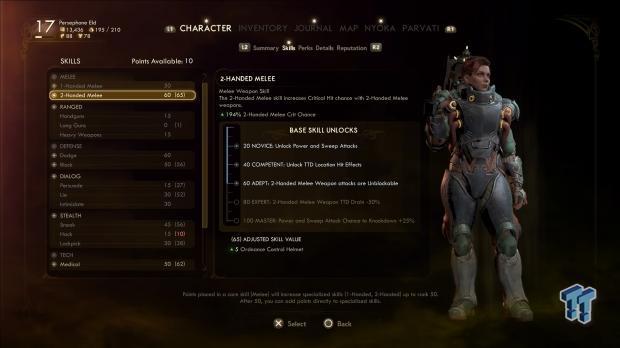
While the FPS mechanics really aren't that special--sorry Obsidian, but you really can't compete with the id Software-powered Fallout 4 here--the main RPG systems are exemplary and refined to a fine sheen. It's here where The Outer Worlds really shines.
What makes the game's RPG systems so great is there's no real feeling of loss or regret. Thanks to the hugely dynamic and multi-faceted skill system that sees certain abilities affecting unexpected things, you never really feel like you're making a mistake.
The system is immensely synergistic and ties everything together in this awesome package that actually makes your character feel, well, like a powerful character.
For example, Persuasion isn't just for dialog. It actually affects combat. Having a higher persuade skill will literally cause the Cower status effect in humans, which basically stuns them for a short period of time. The higher your persuasion skill, the more damage you do against Cowered targets.
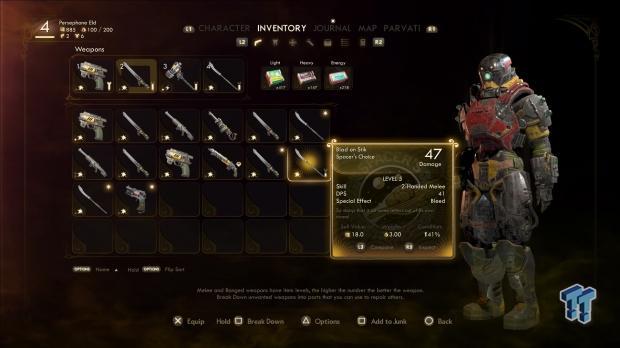
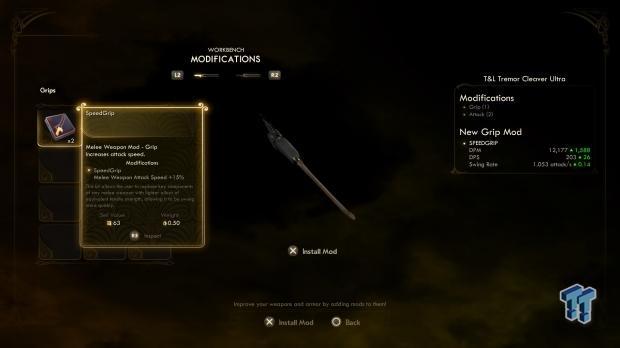
The same is true for the Lie skill (yes, there's a Lie skill, and it's awesome), which can confuse and Scramble robots to fight on your side. The Intimidate skill is the same and causes wild creatures to flee in Terror. This is great for a ranged character who likes picking off baddies from a distance.
Again, all of these dialog skills affect gameplay outside of dialog. That's incredibly refreshing to see, and the way Obsidian did it deserves lots of commendation.
Skills give you nifty bonuses every 20 levels. There are lots of unique choices here to round out your character's abilities in and outside of combat. Throw in an awesome companion system that not only lets you equip your team with custom weapon and armor loadouts but also pick their passive perks; you have the blueprint for some truly synergistic builds.
There's a great perk tree that gets better and better as you level up. Mixing and matching your perks properly is essential to surviving on harder difficulties like Supernova.
You can respec your character for some bits (the in-game currency) on your ship, which is great. But more important than that, the game gives you plenty of opportunities to solve specific problems in specific ways. If you don't have enough Persuasion for a dialog skill-check, you can chug some purple berry wine for a boost, or have Felix jump in your party.
The game gives you many ways to shore up your weaknesses, whether it be with specific gear, consumables, or your teammate's passives.
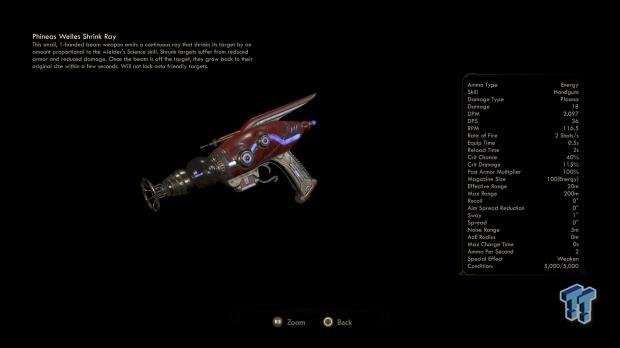
The items themselves are great. There's tons of stats, elemental affinities, and a systemic series of values that defines the classes of items--whether it be 2handed mauls or fast pistols. Everything is balanced in a way that seems fair and useful, depending on your build.
Ultimately, The Outer Worlds isn't all that innovative. It's more cohesive than anything and consistent. The game ties together a lot of the classic things Obsidian is known for in a delectable treat rather than pushing any real new boundaries. And honestly, that's enough. But it's important to understand what the game is and what it isn't.
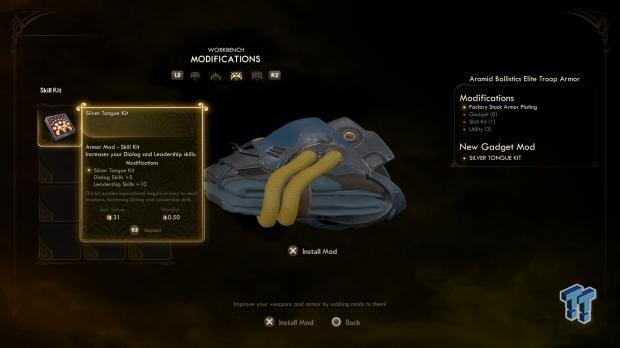
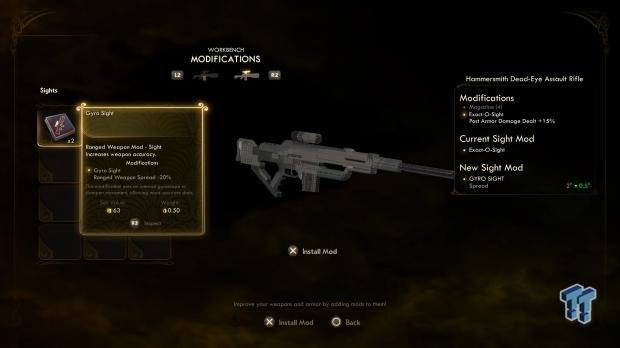
The Outer Worlds does a lot of things that other games did before it. The game essentially borrows some of the best things from gaming while being infused with Obsidian's amazing storytelling.
It has its own VATS-style system that slows time instead of freezing it, a nifty dodge-roll mechanic, as well as a big crafting system that lets you upgrade, repair, or mod weapons and armor. It lets you use a variety of weapons, from melee two-handers to guns and sniper rifles, and there are lots of consumables.
One interesting thing The Outer Worlds did was the inhaler, which is kind of like the alchemy skill in Elder Scrolls games. With a high enough Medical skill, you can add up to four consumables into the inhaler and get some serious bonuses at once. This is immensely helpful during the harder mini-boss battles.
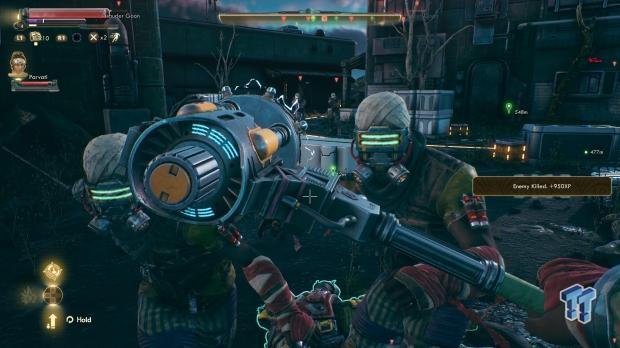
Combat in itself isn't all that crazy and tends to get rather rote and sometimes tedious. The basic formula for The Outer Worlds is: pick up a quest, talk to some NPCs, run around in the world and shoot stuff, and loot items. That's pretty basic for any game these days, and it's not to say that certain moments don't pop out, but I would say combat isn't entirely memorable.
If anything, combat is a playground for you to test out your new goodies, whether it be a new skill or shiny new gun. A lot of the time, it feels like it's there to break up the awesome dialog sequences.
Obsidian's best dialog and character-building to date
If the deep RPG system is the cake, then the dialog and storytelling is the icing on top. Obsidian is in top form here, and The Outer Worlds has some of the quirkiest, most enamoring, and surprisingly deep storytelling from the developer.
The characters feel alive and unique, complete with their own personalities, abilities, and traits. Parvarti, the absolutely amazing bashful engineer, is surprisingly layered and has a rather interesting romantic loyalty quest. You're basically gallivanting across the solar system to find cakes and other goodies to help Parvarti court her crush.
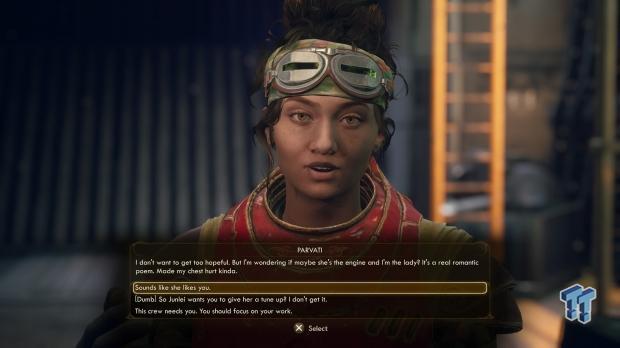
They'll not only help you in battle, but interject in dialog sequences to give you advice, crack a joke, and provide feedback. They're ever-present without being a hindrance and genuinely feel like part of your team. The ragtag bunch of misfits reminds me of Red Dwarf in a way, especially with the theme of a bunch of underdogs teaming up to go planet-hopping across an oppressive universe.
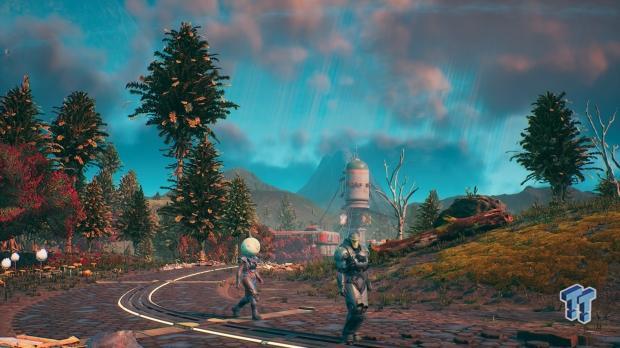
The other characters are nuanced and interesting too. Ellie is more of a rakish rapscallion, kind of like a female Han Solo, and Nyoka is like a drunken bounty hunter in space. There's even a robot that will clean your ship for you as well as help you destroy enemies. It's great.
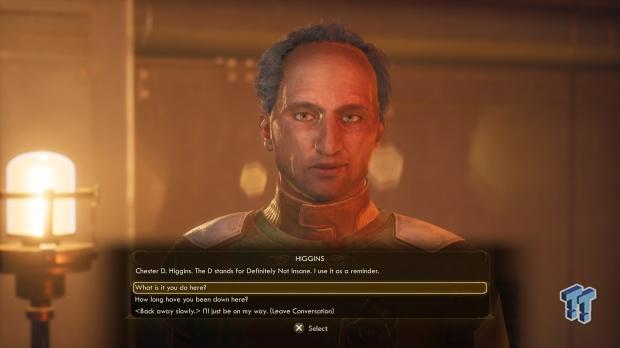
The NPCs are also amazing too. Everyone you meet is pretty much a character in their own right, and you can tell Obsidian had tons of fun writing the characters out.
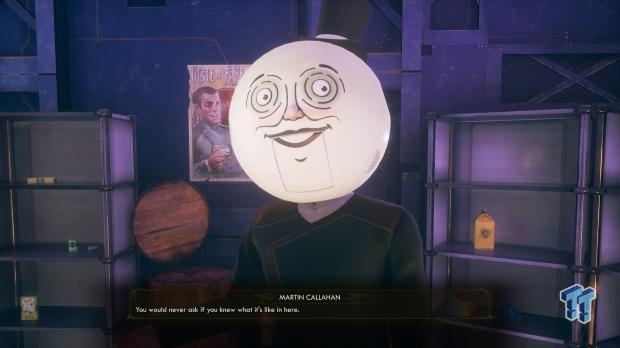
There's an NPC that has to wear a Spacer's Choice moonman helmet 100% of his life (Martin Callahan, one of the best NPCs in any game ever), a weird drug addict that can run around the cosmos with his mind, some killer cannibals that totally want you to stay for "dinner," and of course a mad scientist that's the best parts of Rick Sanchez and Doc Brown.
There's even a lady who solved a famine crises by grinding up dead bodies to feed to her followers. And a guy who went absolutely batshit after being locked in an abandoned power facility for years.
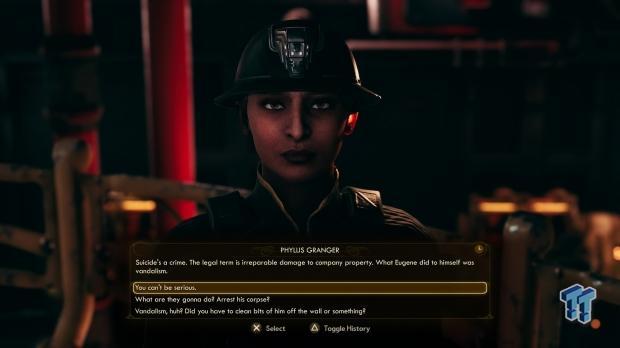
The storytelling is top-notch and often puts you in impossible situations. The kind of nail-biting, anxiety-ridden situations that permanently affect your game.
At many points in the game, you're put at a crossroads and have to make tough decisions. Right at the very beginning, you have to make one such decision at Edgewater, and it's pretty delicate. How you weave through the situations using your dialog skills and know-how determines peoples' fates.
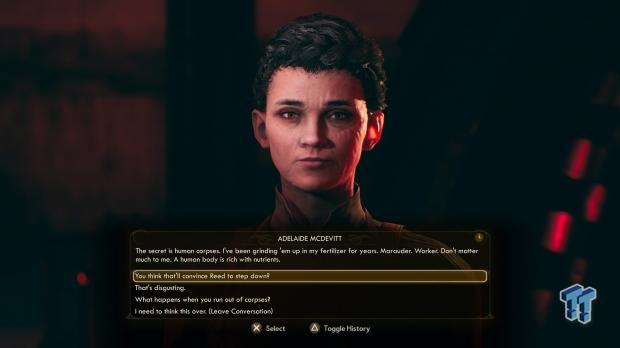
These crossroad moments bring a real sense of meaning to your actions and puts you in the hot seat. It's pretty damn engaging.
Things get pretty intense when you actually start to like the NPCs, which is pretty easy given how interesting and fun they are.
A very small but awesome detail I noticed is the game records every step you make in a questline. This is fantastic because it lets you go back and check to see how you handled certain situations, why things happened, and lets you know what to do (or what not to do) in your next playthrough.
The direct dialog-and-action-based storytelling is aided by a silent helper: The art direction.
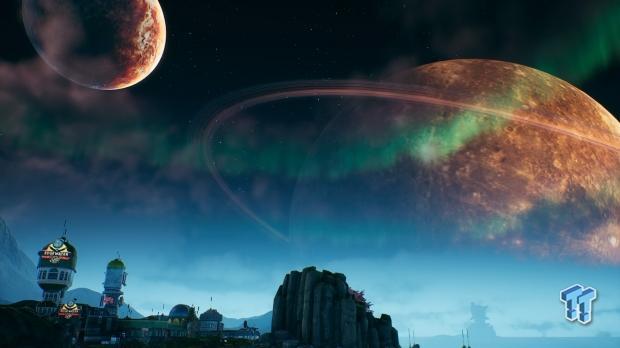
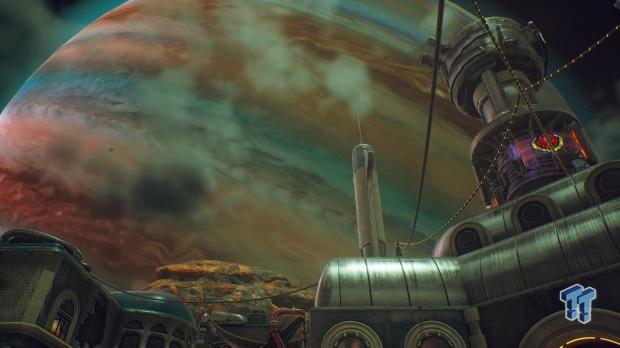
The Outer Worlds is a beautiful game, and the environments tell a visual story without having to say anything. Without the junky, broke-down, and Star Wars-like steampunk technology and neon signs and Red Dwarf-esque futurism, neither the characters no the story would be nearly as effective.
The setting frames everything in The Outer Worlds. It's the canvas in which everything is painted. The amazing giant Groundbreaker spaceship-city speaks volumes, as does the desolate fishing cannery town of Edgewater, or the It's not a hyper-futuristic journey into the heart of high-level sci-fi; it's more of an RPG romp in The Hitch-hiker's Guide to the Galaxy, complete with humor and weird tech.
Your ship isn't some decked-out specialized starfighter. It's more like the Starbug of this particular alternate universe, a freighter that's made to haul cargo for cruel corporations, not jaunting around the galaxy.
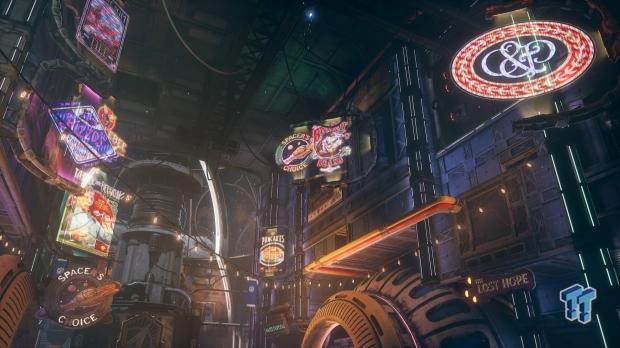
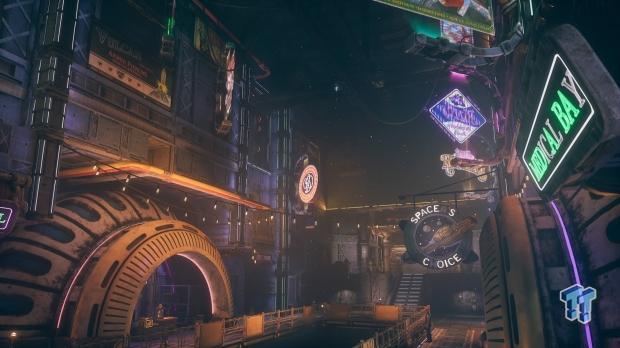
There's a kind of haughty grandeur in The Outer Worlds' style and artistic design. A sense of hollow corporate logos, advertisements, and neon signs, all with hilarious taglines like "It's not the best choice, it's SPACER'S CHOICE!" Obsidian is poking serious fun at big corps like Amazon and Apple while lampooning America's emphasis on brands and soulless capitalism.
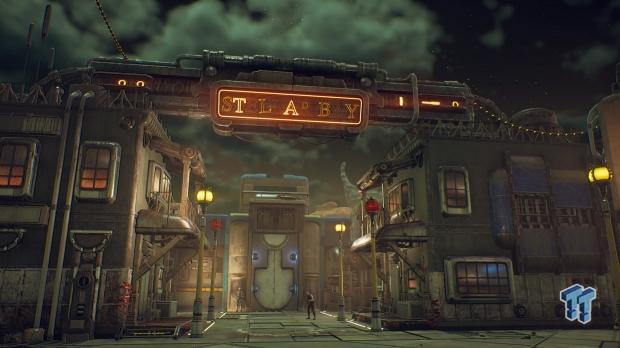
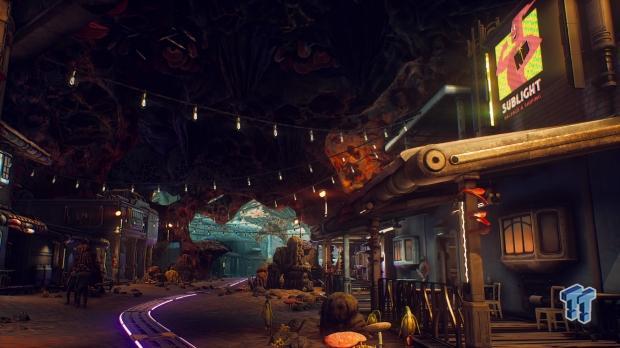
Although the backdrops are beautiful and often visually meaningful, the world structure is quite threadbare.
The Outer Worlds isn't billed as an open-world game, but it does feature planets that have open areas for you to explore. And by explore, I mean basically kill enemies, pick up look, and solve/enact sidequests. The worlds don't have a whole lot going for them. There's no innovative reactivity like, say, Breath of the Wild; the worlds feel static and artificial, and it can be distracting at times.
Yes, they're beautiful, and yes, they have interesting features and day-to-night cycles, but they feel empty nonetheless.
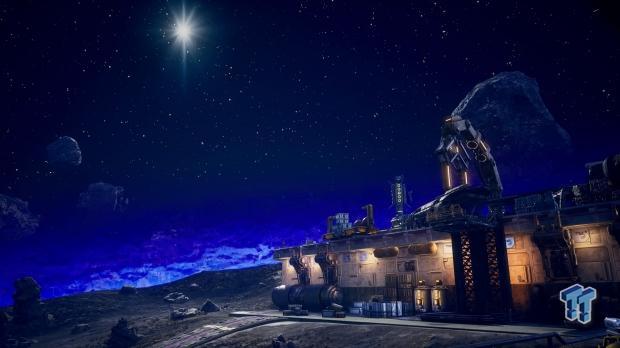
Conclusion: The best RPG of 2019
Despite its strengths, The Outer Worlds does have that telltale Obsidian jank to it. The combat isn't as streamlined as it could (or should) be, and the world itself isn't entirely immersive. But the RPG aspects, dialog, and character depth make up for those shortcomings, creating an experience that's both familiar and unlike any RPG of 2019.
A bit of warning about The Outer Worlds, though: It's not something I think you should play by itself. I think The Outer Worlds works best when you compliment it with another game. It's kind of like the veggies to your meat and makes for a great well-rounded gaming diet. It's an RPG that makes you read a lot and pay attention to details to get the full scope of the experience.
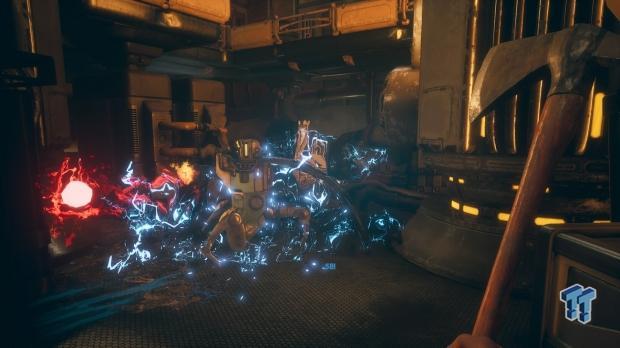
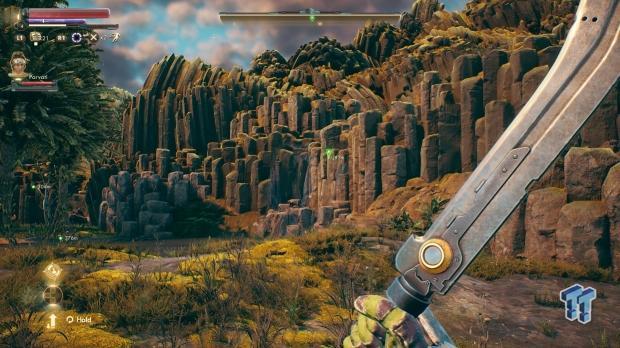
If you're the type of gamer who always wants to be engaged with chaotic action like Destiny 2, then you might want to steer clear. The Outer Worlds is mostly a slower burn full of thoughtful planning and examination/investigation. It's a lot less interactive than action games and sometimes feels monotonous, so I found myself breaking away from time to time to enjoy mindless chaos in another game.
But The Outer Worlds is the purest example of what RPGs can and should be. It's an ode to cRPG games of old but propelled to the modern age in a more mainstream FPS vehicle. The game incorporates all of Obsidian's best talents and reminds the world that, hey, you can still play a Fallout game that isn't made by Bethesda--even if it's not actually called Fallout.
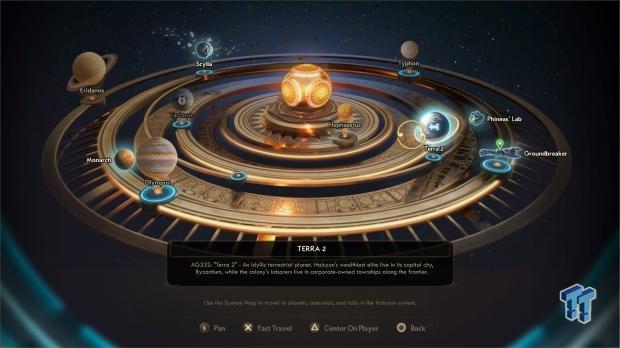
If you loved Fallout: New Vegas or enjoy RPGs where your choices matter, characters feel meaningful, and you can make some pretty crazy builds with the right weapon and skill setup, then definitely buy The Outer Worlds.
With this blueprint, I can say The Outer Worlds is the best RPG of 2019, even as an AA game.
What's Hot
+ Amazing dialog
+ Superb characters and storylines, NPCs have actual personality
+ Dialog choices actually matter, game puts you at important crossroad moments
+ Flaw system brings back old-school Fallout vibes
+ RPG is a mix of KOTOR and Fallout: New Vegas, ever skill matters
+ Quirky, humorous spin on rampant captalism
+ Incredible visual style and art direction
+ Martin Callahan and Parvati are the best NPCs ever
What's Not
- Not much innovation
- FPS combat isn't the best
- Minor glitches/hiccups
- World feels lifeless
- The map could use a lot of work (no custom markers, is kind of awkward/slow)

Visuals and Graphics |
85% |
RPG Elements |
100% |
Storyline and Dialog |
100% |
FPS Combat |
75% |
Overall |
90% |
The Outer Worlds is the best RPG of its kind in 2019, combining New Vegas and KOTOR in one. If you like Obsidian games, this one's for you.

Related Tags

